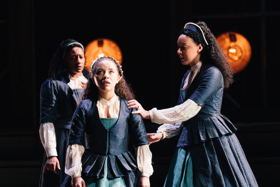Review: EMILIA, Vaudeville Theatre
|
![]() "We are only as powerful as the stories we tell." So proclaims poet and activist Emilia Bassano, as she wrestles back her own story in Morgan Lloyd Malcolm's 2018 Globe hit - its raw, feminist, revolutionary power just as potent in this West End transfer.
"We are only as powerful as the stories we tell." So proclaims poet and activist Emilia Bassano, as she wrestles back her own story in Morgan Lloyd Malcolm's 2018 Globe hit - its raw, feminist, revolutionary power just as potent in this West End transfer.
 Emilia is generally believed to be the 'Dark Lady' of Shakespeare's sonnets - but in this telling, she's far more than mere muse or lover. She's a writer of the Bard's equal, yet his work (which features her words and perspective) is celebrated, while Emilia's attempt to share her own is considered criminal, even demonic.
Emilia is generally believed to be the 'Dark Lady' of Shakespeare's sonnets - but in this telling, she's far more than mere muse or lover. She's a writer of the Bard's equal, yet his work (which features her words and perspective) is celebrated, while Emilia's attempt to share her own is considered criminal, even demonic.
This all-female production is a fierce corrective to such marginalisation, but it's not just an historical enterprise; the contemporary parallels ring out in Lloyd Malcolm's deliberately confrontational, Renaissance poetry-meets-modern slang script. Emilia, trained in the ways of court, immediately learns to limit herself: "I must try to whisper more"; "I must not take up too much space". Sadly familiar.
Daughter of an immigrant Venetian musician, she's also subject to Brexit-y racism and class snobbery; at best, men view her as "exotic", or as a damsel to save. Nicole Charles's vivid production illustrates the absurdity of male posturing, with its thrusting, mansplaining, generally clueless blokes; Jackie Clune, in particular, plays brilliantly off the audience as the villainous misogynist Lord Howard.
But there are also poignant and - once again - strikingly contemporary moments, such as motherhood overcoming Emilia's ambition to write; a baby is literally thrust into her arms in place of a book. The darker (and more effective) second half also shows the horrifying consequences of challenging the status quo, as Emilia's efforts to educate and empower women are met with violent suppression.
The title character is richly drawn by three actresses in different stages of her life: Saffron Comber, fiery and assured; Adelle Leonce, working through grief and betrayal to rediscover her purpose; and Clare Perkins, the shrewd commentator and eventual furious warrior.
Together, they show the layers of experience as Emilia struggles to hold onto her identity, as well as suggesting she is the conduit for a multitude of women - the one giving voice to many. Nor can she be easily contained or pigeonholed by the men who fear her, and what she represents.
Charity Wakefield creates a flawed ally in Will Shakespeare, who respects Emilia in their verbal sparring and romantic encounters, but not enough to recognise her as a fellow artist - particularly if that punctures his own ego. It's a funny, beguiling, ultimately heartbreaking portrait.
There's great support throughout the ensemble, playing everything from washerwomen and whores-turned-poets to courtly nobles and ladies, plus stirring music from Luisa Gerstein, with the musicians integrated into the cast to lend extra dramatic force to key moments.
Joanna Scotcher's circular set evokes the Globe, and its bookshelves keep the major theme of who tells our stories in mind, though some audience interactive elements inevitably don't work as smoothly here.
Anna Morrissey's movement is excellent, whether wittily skewering Renaissance dances or creating indelible ensemble moments that amplify Emilia's emotional state, as well as suggesting a universal female experience and sisterly solidarity; at Emilia's lowest point, it's women who lift her up.
Given the celebration here of writing as a radical act, even - perhaps particularly - if the messages are skilfully hidden or expressed metaphorically, it's a shame that Lloyd Malcolm's script tends towards the bluntly didactic; there are times when the engagement as drama is superseded by the polemical. The script, already revised for the West End, could use a few further trims.
More effective is the way that Charles's production itself illustrates those points: the power of equal representation on stage via a diverse, thrillingly female company; the way that, in turn, energises and inspires an audience; and the lingering questions about why this is - still! - such a rarity, and how women can fight to be heard.
Yet it's hard to deny the spine-tingling force of Perkins' final speech - a direct address to the audience that smashes through the fourth wall. As Emilia expresses how anger is at her core, she urges us to "listen to every woman" and "take that fire as [our] own".
It may not be subtle theatre, but her directness is emboldening, annihilating the advice handed down to generations of women to be quiet, accommodating, sweet, obedient and patient. Time is up, and polite calls for change too slow - in theatre, in society, everywhere. Instead, join Emilia, and countless others, in this cathartic roar.
Emilia at Vaudeville Theatre until 15 June
Read our interview with Charity Wakefield
Photo credit: Helen Murray
Comments
Videos
